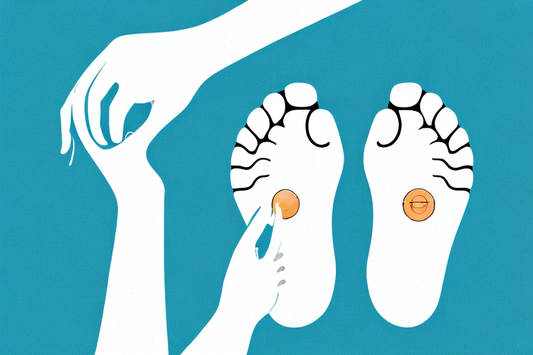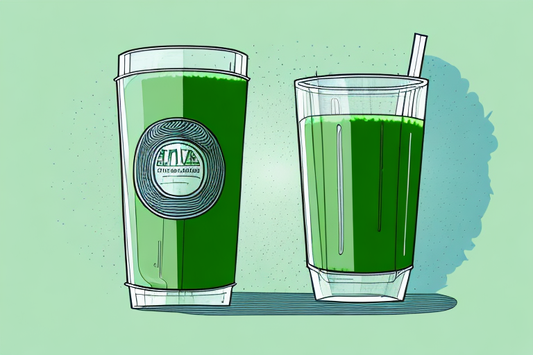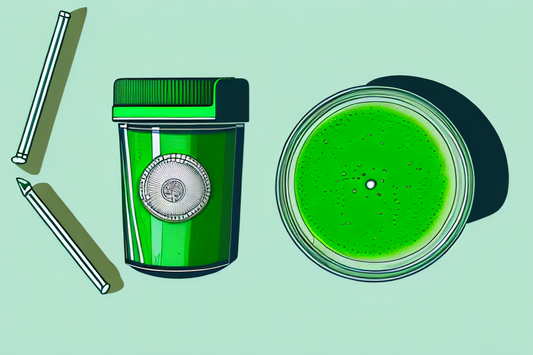
The One Vitamin-Like Chemical That Can Heal Neuropathy and Nerve Damage in Feet and Hands: Peripheral Neuropathy
If you suffer from peripheral neuropathy, a condition that affects your feet and hands, you know just how debilitating the symptoms can be. But did you know that there is a vitamin-like chemical that can help heal nerve damage and restore your quality of life? It's called benfotiamine, and in this article, we'll explore what this nutrient is and how it can help treat peripheral neuropathy.
Understanding Peripheral Neuropathy
What is Peripheral Neuropathy?
Peripheral neuropathy is a condition that occurs when the nerves in the peripheral nervous system are damaged or destroyed. This system connects the brain and spinal cord to the rest of the body, including the arms, hands, legs, and feet. When the nerves in your feet and hands are damaged, you may experience symptoms such as numbness, tingling, and weakness.
Peripheral neuropathy can affect one nerve (mononeuropathy) or multiple nerves (polyneuropathy). The condition can also be classified by the type of nerve that is affected, such as sensory, motor, or autonomic nerves.
Common Symptoms and Causes
The symptoms of peripheral neuropathy can vary depending on the severity of the nerve damage, but some of the most common include:
- Numbness or tingling in the feet or hands
- Sharp, stabbing pain
- Muscle weakness or difficulty moving the limbs
- Sensitivity to touch
Peripheral neuropathy can have a variety of causes, including:
- Diabetes: High blood sugar levels can damage nerves over time.
- Chronic kidney disease: Kidney damage can lead to high levels of toxins in the blood, which can damage nerves.
- Autoimmune disorders: Conditions such as lupus and rheumatoid arthritis can cause the immune system to attack the nerves.
- Certain medications: Chemotherapy drugs and medications used to treat HIV can cause nerve damage.
- Infections: Viral or bacterial infections can damage nerves.
Risk Factors and Complications
Some people are more at risk for developing peripheral neuropathy than others. Risk factors include:
- Age: The risk of peripheral neuropathy increases as you get older.
- History of alcohol abuse: Long-term alcohol abuse can damage nerves.
- Exposure to toxins: Exposure to chemicals such as pesticides and solvents can damage nerves.
- Certain medical conditions: Conditions such as HIV, lupus, and rheumatoid arthritis can increase the risk of peripheral neuropathy.
Complications of peripheral neuropathy can include difficulty walking, poor balance, and loss of muscle mass. If left untreated, peripheral neuropathy can lead to permanent nerve damage and disability. It is important to seek medical attention if you are experiencing symptoms of peripheral neuropathy.
Treatment options for peripheral neuropathy include medications to manage pain and other symptoms, physical therapy to improve strength and balance, and lifestyle changes such as quitting smoking and managing underlying medical conditions such as diabetes.
The Role of Vitamins and Nutrients in Nerve Health
Have you ever wondered how your nerves work? The truth is, your nerves rely on a variety of vitamins and nutrients to function properly. Without these essential nutrients, your nerves may not work as well as they should.
Essential Vitamins for Nerve Function
Some of the most important vitamins for nerve function include:
- Vitamin B12: This vitamin is essential for nerve health and can help prevent nerve damage. It is found in animal products like meat, fish, and dairy, so vegetarians and vegans may need to supplement.
- Vitamin B6: Another key vitamin for nerve function, vitamin B6 plays a role in the synthesis of neurotransmitters. It is found in foods like bananas, chicken, and potatoes.
- Vitamin E: This antioxidant vitamin can help protect your nerves from oxidative damage. It is found in foods like almonds, spinach, and avocado.
By making sure you get enough of these vitamins in your diet, you can help keep your nerves healthy and functioning properly.
Nutrient Deficiencies and Neuropathy
If you aren't getting enough of certain vitamins and nutrients in your diet, it can lead to nerve damage and peripheral neuropathy. For example, vegetarians and vegans may be at a higher risk for vitamin B12 deficiency, as this vitamin is primarily found in animal products. Those with malabsorption issues may also struggle to absorb enough of certain nutrients, leading to deficiencies.
It's important to talk to your doctor or a registered dietitian if you are concerned about your nutrient intake. They can help you come up with a plan to make sure you are getting all the vitamins and nutrients you need to keep your nerves healthy and functioning properly.
So next time you sit down to eat, remember that the food on your plate plays a crucial role in keeping your nerves healthy and functioning properly.
The Vitamin-Like Chemical: Benfotiamine
What is Benfotiamine?
Benfotiamine is a vitamin-like chemical that is derived from thiamine, or vitamin B1. While it is not technically a vitamin, benfotiamine is an important nutrient that can help support nerve health.
Benfotiamine is a fat-soluble compound that is more easily absorbed by the body than thiamine. This makes it an ideal supplement for those who may have difficulty absorbing thiamine from their diet or other supplements.
How Benfotiamine Works to Heal Nerve Damage
Studies have shown that benfotiamine can help increase levels of thiamine and other B vitamins in the body, which can in turn help protect nerve cells from damage and promote nerve regeneration. Additionally, benfotiamine has been shown to have anti-inflammatory properties that can also benefit nerve health.
Benfotiamine works by increasing the production of a molecule called thiamine pyrophosphate (TPP), which is essential for the proper function of nerve cells. By increasing TPP levels, benfotiamine can help protect nerve cells from damage and promote their repair and regeneration.
The Benefits of Benfotiamine for Neuropathy
Benfotiamine may offer a variety of benefits for those with peripheral neuropathy and other nerve-related conditions. Some of the most promising benefits include:
- Reduced pain and numbness: Benfotiamine has been shown to reduce pain and numbness in those with peripheral neuropathy, making it a promising treatment for those who suffer from these symptoms.
- Improved nerve function and sensation: By promoting nerve repair and regeneration, benfotiamine can help improve nerve function and sensation, allowing those with neuropathy to regain some of their lost mobility and sensation.
- Enhanced blood sugar control: Benfotiamine has been shown to help regulate blood sugar levels in those with diabetes, which can help prevent further nerve damage and improve overall health.
- Reduced inflammation: Benfotiamine's anti-inflammatory properties can help reduce inflammation in the body, which can help improve overall health and reduce the risk of chronic diseases.
Overall, benfotiamine is a promising nutrient that can help support nerve health and improve symptoms of neuropathy and other nerve-related conditions. Whether you are looking to improve your nerve function, reduce inflammation, or simply support your overall health, benfotiamine may be a valuable addition to your supplement regimen.
Scientific Studies Supporting Benfotiamine's Effectiveness
Clinical Trials and Research Findings
Benfotiamine, a synthetic derivative of thiamine, has been extensively studied for its effectiveness in treating peripheral neuropathy. One study conducted on patients with diabetic neuropathy found that benfotiamine supplementation helped improve nerve function and reduce symptoms, such as numbness, tingling, and pain. The study also found that benfotiamine had a positive effect on the patients' quality of life, as they reported better sleep and improved mood.
Another study conducted on patients with alcoholic neuropathy found that benfotiamine could help improve sensation and reduce pain. The study found that benfotiamine was effective in reducing the severity of neuropathic pain and improving the patients' ability to perform daily activities.
In addition to its effectiveness in treating peripheral neuropathy, benfotiamine has also been studied for its potential benefits in preventing and treating other health conditions. A study conducted on patients with chronic kidney disease found that benfotiamine supplementation helped reduce inflammation and oxidative stress, which are known to contribute to the progression of kidney disease.
Comparing Benfotiamine to Other Treatments
While there are several treatments available for peripheral neuropathy, benfotiamine offers a unique combination of benefits. Unlike traditional pain medications, such as opioids and nonsteroidal anti-inflammatory drugs (NSAIDs), benfotiamine has fewer side effects and is less likely to lead to dependence or addiction. Additionally, unlike certain prescription medications, such as gabapentin and pregabalin, benfotiamine does not require a prescription and is widely available over the counter.
Furthermore, benfotiamine has been found to have a positive effect on blood sugar levels, making it a potentially beneficial supplement for individuals with diabetes. A study conducted on patients with type 2 diabetes found that benfotiamine supplementation helped reduce fasting blood glucose levels and improve insulin sensitivity.
Overall, benfotiamine is a safe and effective supplement that offers a unique set of benefits for individuals with peripheral neuropathy and other health conditions. Its ability to improve nerve function, reduce pain and inflammation, and regulate blood sugar levels make it a valuable addition to any wellness routine.
Incorporating Benfotiamine into Your Treatment Plan
If you're dealing with peripheral neuropathy, you know how debilitating the condition can be. Nerve damage can cause a range of symptoms, from tingling and numbness to shooting pain and muscle weakness. Fortunately, there are a number of treatments available to help manage these symptoms, including benfotiamine.
Benfotiamine is a synthetic form of thiamine, or vitamin B1. It's been shown to have a number of health benefits, including improving nerve function and reducing inflammation. But how can you incorporate benfotiamine into your treatment plan?
Recommended Dosage and Usage
Before adding any new supplement to your regimen, it's important to talk to your doctor first. They can help you determine the right dosage and usage for your specific needs. In most cases, doses of up to 600mg per day are considered safe and well-tolerated.
It's also important to note that benfotiamine is not a cure for peripheral neuropathy. Rather, it's a tool that can help manage symptoms and improve overall nerve health.
Possible Side Effects and Interactions
While benfotiamine is generally considered safe at recommended doses, some people may experience mild side effects such as upset stomach or diarrhea. If you experience any adverse effects, be sure to talk to your doctor.
Additionally, benfotiamine can interact with certain medications, including diuretics and blood thinners. If you're taking any prescription or over-the-counter drugs, be sure to talk to your doctor before adding benfotiamine to your regimen.
Tips for Maximizing Benfotiamine's Benefits
If you're taking benfotiamine for peripheral neuropathy, there are several things you can do to maximize its benefits. These include:
- Eating a healthy diet rich in B vitamins and other nutrients. This can help support nerve health and overall wellness.
- Exercising regularly to improve blood flow and nerve function. Even gentle exercise, like walking or yoga, can be beneficial.
- Reducing stress and practicing relaxation techniques. Stress can exacerbate symptoms of peripheral neuropathy, so finding ways to manage stress is important.
- Talking to your doctor about other treatments that may be beneficial. Benfotiamine can be a helpful addition to your treatment plan, but it's not a one-size-fits-all solution. Your doctor can help you explore other options that may be beneficial for your specific needs.
Remember, managing peripheral neuropathy is a journey. It may take time to find the right combination of treatments that works for you. But with patience, persistence, and the support of your healthcare team, you can find relief and improve your quality of life.
Conclusion
If you suffer from peripheral neuropathy or other nerve-related conditions, benfotiamine may offer a safe and effective way to promote nerve health and reduce symptoms. Talk to your doctor to learn more about this powerful nutrient and how it can help you live a more comfortable, fulfilling life.




